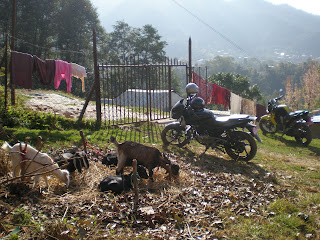Afternoon Puja
“Dhanybhad” and “dukhchha” are two of the first Nepali phrases I learned during my stay as a volunteer practitioner at the Vajra Varahi Healthcare Clinic in the village of Chapagoan. The first phrase is defined as thank you while the second is translated as pain. Although the definitions of these two phrases can be interpreted universally, my perception of the meanings of these words has changed, transformed and evolved during my experience. What I once believed to have been two words that were easily defined and observed, they now present in a more abstract way that has lead me to reflect upon and seek a deeper understanding. In this pursuit, many questions have surfaced relating to my observations of pain, gratitude and the results of care based on the effectiveness of the overall patient/practitioner relationship. For example, how is pain determined and processed individually and how does a single condition effect people so differently? How much does physical pain effect an individuals emotional health and overall quality of life? How is quality of life for an individual defined and do I have a role in judging and or determining this for a patient? Why, as a practitioner is it so easy to accept the appreciation, gratitude and praise from patients when its them who is providing the opportunity to learn, grow and practice skills and utilize knowledge? Overall, how can one learn to understand and empathize with another’s pain in order to communicate more effectively how a treatment can effect a condition? How much does culture effect perceptions of pain and the ability to humbly provide and receive thanks? And finally, how does this information help practitioners in the field of therapeutic massage? Although I may never have adequate or thorough answers to these questions, the thoughts provoked from them have come to symbolize my experience in Nepal and provide a pleasant reminder of my mission as an individual and practitioner in the healing fields. As I prepare to leave Nepal for home my own form of “dukhchha” has developed from the thoughts of missing the wonderful people and culture that welcomed me into their community. For all the patients, interpreters, staff and practitioners that helped cultivate this experience allowing professional and personal growth for me, I wish to express with all sincerity......”dhanybhad!”
|
Jennifer and I in front of clinic.
|
|

